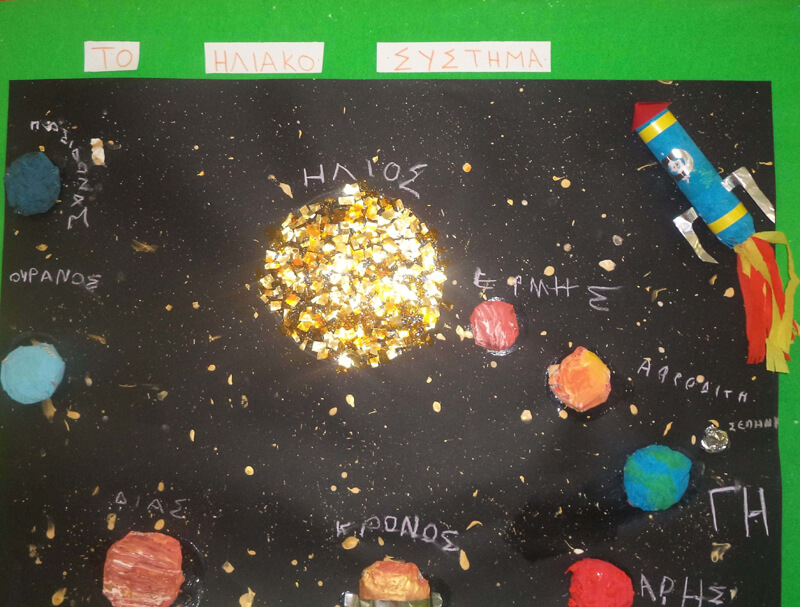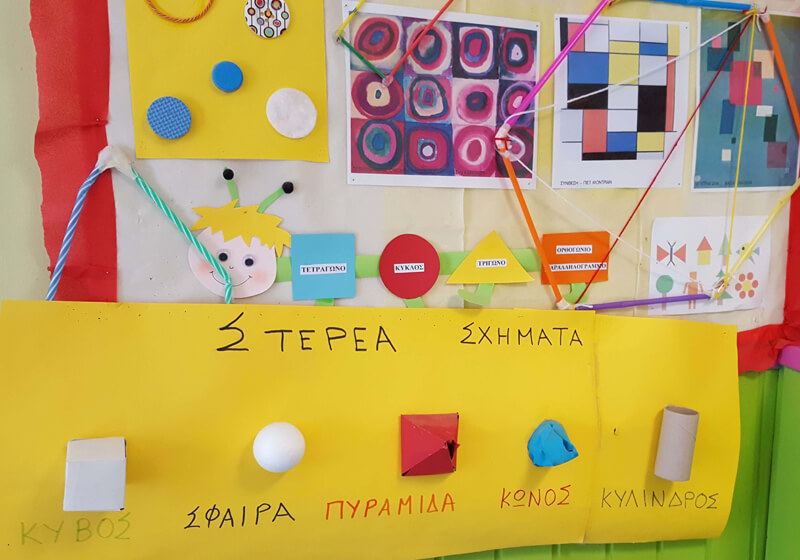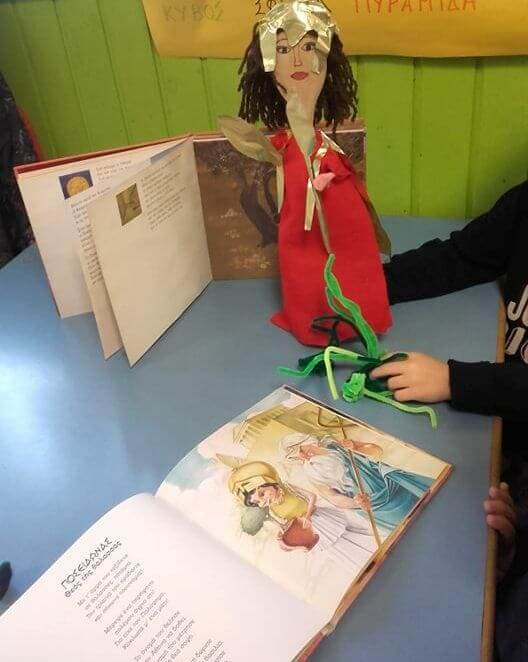NEWSLETTER_SUBTITLE
Kindergarten
OUR PHILOSOPHY
Margarita Kindergarten is established and operates according to the directions of the Ministry of Education, as it belongs to the Primary compulsory education for children aged 5-6 years.
The purpose of the Kindergarten, according to the current legislation, is to help children develop physically, emotionally, mentally and socially within the broader objectives of Primary education.
Following the modern trends in the education of preschool children and constantly aiming at the quality upgrade of our Kindergarten, through the enrichment of the basic educational program, our participation in innovative programs and actions, the application of modern teaching methods, we created a rich in learning environment stimuli.
Guided by the comprehensive personal development of students / three, as well as the adoption of positive attitudes towards learning, children have opportunities to interact, to express themselves, to reflect, to explore, to experiment, to approach new concepts, to create , to discover, always following their individual growth rate.
Basic principles of our Kindergarten are
-
Utilizing children's previous knowledge and experiences
-
Encouraging active participation in the learning process
-
Enhancing natural curiosity, gaining experiences and new knowledge in an experiential way
-
Cultivating multiple skills
-
Activating Thought and Unleashing Creativity
-
Utilizing the game as a key tool for development and learning
-
Developing autonomy and strengthening initiative
-
Stimulating self-esteem and cultivating empathy
In a school environment that supports and respects children, makes them feel safe and confident, become creative and evolve, achieve learning objectives effectively and thus highlight the quality of our educational work.
METHODOLOGY
The design and implementation of the educational program follows the experiential approach of knowledge, through the development of thematic units and work plans (Project Method), emphasizing the interdisciplinarity and the holistic perception of knowledge.
Through the interdisciplinary approach, a more comprehensive and interdisciplinary acquisition of knowledge is achieved, linked to the experiences and experiences of children's daily lives.
The organization of teaching is done by utilizing modern teaching methods & innovative practices (such as gamification, storytelling, etc.) and based on the principles of experiential, exploratory learning.
The activities that are developed, strengthen the team-collaboration work and favor the interaction, the communication, the utilization of the technology, the written and oral speech. Actions are linked to the interests and needs of children, who learn to share the joy of success by contributing to a team effort.
BASIC EDUCATIONAL PROGRAM
The educational program of our Kindergarten is shaped according to the Interdisciplinary Unified Curriculum Framework for Kindergarten (DEPPS-APS). Through the planning and development of activities in respective cognitive fields, the learning objectives are approached and the comprehensive development of the children is achieved. is flexible and adapts accordingly.
BASIC PROGRAM
LANGUAGE
Preparation for the enrichment of the spoken word and the gradual acquisition of the written word of the children. Children are encouraged to engage in discussions and dialogue, to tell stories, to describe events and experiences, to learn poems and tongues, improving their oral speech. In the daily life of the kindergarten, the children come in contact with different versions of the written word, achieving their gradual acquaintance with the morphological characteristics of a text, adopting the basic reading conventions of the alphabetic writing system.
At the same time, through various activities and language exercises / games, they gradually acquire the phonetic character of the language and manage to distinguish phonemes as components of words. Awareness of the relationship between spoken and written language and the correspondence of phonemes of the language with the letters (symbol recognition) are a basic goal of the Language program. Children are supported in their efforts to copy words and write as best they can, as they are motivated to master writing.
Verbal communication
Improving and enriching children's oral speech (storytelling, descriptions of events and experiences, interpretation of phenomena, participation in discussions and presentations of works, use of argumentation, phonological awareness).
Writing & Reading
Contact of children with different versions of written language (in books, magazines, newspapers, posters), comprehension of texts and adoption of basic reading conventions of the alphabetic writing system (such as reading from left to right). Awareness of the connection of written and oral speech, as well as the correspondence of phonemes with letters. Enrichment of children's vocabulary through its contact with literary texts. Children recognize and write the letters of the alphabet, learn to spell and read words.MATHEMATICS
Through the Mathematics program, children have opportunities to apply mathematics to their daily routine, seeking to enhance mathematical thinking. Through appropriately designed activities and teaching interventions, children are involved in reflection situations and process sizes, quantities, shapes, relationships and numbers. At the same time, opportunities are given to observe, classify, rank, use objects and symbols, do simple student operations, list objects, measure, use numerical expressions, compare, edit tables, depict relationships in scoreboards, and in graphs. They are encouraged in an experiential way to point out and describe simple spatio-temporal relationships, to reproduce patterns and to recognize symmetrical shapes.
ANTHROPOGENE ENVIRONMENT & INTERACTION
In a stimulus-rich environment inside and outside the classroom, children are encouraged to engage in activities, interact, take initiatives, collaborate, express themselves, develop positive emotions to cultivate life values. Through experimentation and exploration, they take advantage of inclinations and discover their potential to learn, respect others and follow rules. The program also helps children to get to know their immediate environment, human achievements, the interaction of the environment with human activities, to get to know customs, folk traditions and historical events.
Familiarization of children with the wider anthropogenic environment. Opportunities for exploring the immediate environment, processing a variety of information and educational material (eg photographs, images, objects, books). Highlighting the usefulness of communication codes, understanding blueprints, symbols, maps (eg concept maps, geographical maps), as well as the contribution of science and technology in people's daily lives. Possibilities of cultivating children's cooperation, through their coexistence and active action in an organized learning environment, which promotes their comprehensive development (emotional, mental-cognitive, communicative, physical, socio-cultural).NATURAL ENVIRONMENT & INTERACTION
The program provides the appropriate stimuli to arouse children's curiosity and to satisfy their need for action and experimentation. In particular, opportunities are given for a variety of explorations, enriching children's knowledge of the human body, animal and plant organisms in their immediate environment. The daily routine of our Kindergarten includes observations and descriptions of meteorological phenomena and changes in the weather and seasons. In addition, the formulation of hypotheses around natural phenomena, the development of ideas and the formulation of conclusions in the conduct of simple experimental procedures are encouraged.
In the yard of our school are implemented many activities (eg gardening) that bring children in direct contact with the natural environment, expanding their knowledge and contributing to the gradual adoption of positive attitudes and attitudes towards the environment.
Children 's contact with elements of the physical world. Organized nature processing activities (eg observation of leaf nerves with magnifying glasses in the school yard). Execution of experimental procedures within the thematic units (colors, water, leaves, air).
CREATION & EXPRESSION
-
The program develops activities visual arts, drama, music and physical education
-
Children experiment with different materials and colors, learn techniques and apply them, draw and paint, cut, shape, shape, and express themselves creatively. Children are given opportunities to recognize works of art, as well as to process important works of art.
-
At the same time, through theatrical play , free dramatic play, improvisation, imitation, pantomime, puppetry, they take on roles, develop their creativity, cultivate their expressive means , release their emotions, develop their aesthetic perception, and create artistic creations. At the same time, they cultivate their communication, form relationships and are led to a better awareness of themselves. Physical expression games, musical games with rhythm and movement / music-motor games, exercises of imagination and observation, role play, dramatizations (stories, fairy tales, poems). Participation in the theatrical performance of a fairy tale, with a structured script and specific roles. Participation in watching theatrical performances.
-
Through the music education program , children have the opportunity to listen to different types of music (classical, art, traditional), to gradually get acquainted with the meaning of sound, to learn songs, edit and get to know musical instruments. At the same time, children can improvise, play music, express themselves through musical compositions and present their musical creations.
TECHNOLOGIA INFORMATION & COMMUNICATION
In the program of the Kindergarten are organized activities that aim at enhancing the contact of children with the computer, as well as with other technological means (tablet, projector).
Children have opportunities to learn about the multiple capabilities of the computer and to become familiar with its various possibilities of use, focusing on its basic functions. Utilizing the computer as a teaching tool that enhances the learning process, children can watch educational videos, interact with digital software, play digital interactive games, learn about the proper and safe use of the internet.
ENGLISH
Activities are developed in parallel with the basic program
-
Music-Motor & Psychomotor Education
-
Music Education
-
Theatrical Play & Theatrical Education
-
Rhythmic Education - Dance
-
Philanagnosias- Literature
-
Aesthetic Education - Visual Arts
-
Emotional Intelligence
EVALUATION - PORTFOLIO
Evaluation is a key part of the educational process of the Kindergarten and concerns its feedback, with the ultimate goal of improving the education provided.
In our Kindergarten, when assessing children, individual characteristics, differences in the way and pace of learning, desires, interests, abilities are taken into account, and the level of their learning development and socialization is assessed, individually and in groups. frame. By creating an atmosphere of acceptance and reward, and focusing on the positive development of children, the approach to knowledge becomes effortless and children feel comfortable making mistakes and learning from them.
Systematic information is provided to parents about their children's progress and the development of the program, through interpersonal meetings with the Kindergarten Teacher. In addition, the individual portfolio of the children (Portfolio) is formed and utilized, which includes representative works such as drawings, paintings, crafts, writing samples. At the end of the school year, the children's assessment file is provided to the parents, highlighting the overall progress of each child.
The contribution of special collaborators (such as Child Psychologist, Pediatrician) and other teachers of our school (such as English teacher, Rhythmic-Dance teacher) is important, in drawing conclusions for the assessment of the overall development of children.
Preparation & Smooth Transition to Primary School
The transition from Kindergarten to Primary School is a critical stage in the lives of children and their preparation is extremely important. This period marks dramatic changes in the life of the child and family and may be accompanied by mixed feelings of joy, excitement, impatience, curiosity, anxiety, anxiety, fear and worry.
Margarita Kindergarten, aiming at the multifaceted development of children (physical, perceptual & sensory, communicative & linguistic, cognitive, emotional, social), the cultivation of skills, the acquisition of knowledge, values and attitudes of life, properly prepares students for Primary school.
The Kindergarten program takes into account the special developmental and learning needs of this age, empowering children at many levels to facilitate their transition to Primary School. At the same time, it lays the foundation for a successful school course, having cultivated a positive attitude towards the learning process.
Our children say goodbye to Margarita every year, having all the necessary supplies for their new



